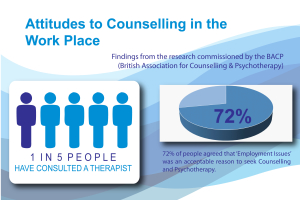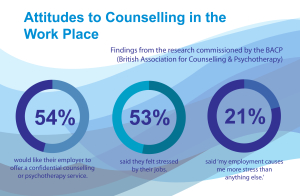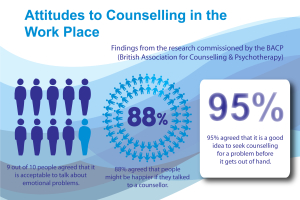World Mental Health Day is celebrated each year, this year it falls on the 10th of October. Each year the World Health Organisation, chooses a ‘topic’ within mental health that they think needs to be discussed in more detail; this year the topic is mental health in the workplace.
We spend a large part of our lives at work, to not acknowledge how work can affect us, can be detrimental to our well-being. However there is still a stigma attached to admitting that you’re struggling in the workplace – people don’t really know what to say or how to act around you. There’s a fear that your professionalism and your ability to work is compromised; that you won’t be able to manage deadlines or perform under pressure, consequently you can be over-looked for promotions. With beliefs such as these circulating the office, it’s no wonder that we are more likely to ask for help if we are suffering from a physical health problem, rather than a mental health problem.
Work-related stress
So what happens is, that we end up going into work, not able to talk to anyone about how we’re feeling and end up being less productive at work. Mental health problems are said to be a major cause of ‘presenteeism’ which is where an employee is unwell but remains in work but is less productive. As much as 60% of the employment related costs of mental illness are due to presenteeism.
Research shows that prolonged stress is linked to psychological conditions such as anxiety and depression as well as physical conditions such as heart disease, back pain and headaches. According to the Labour Force Survey 2015/2016 the predominant cause of work related stress can be put down to:
- tight deadlines
- too much work or too much pressure or responsibility
- a lack of managerial support
- organisational changes at work
- violence or bullying
- role uncertainty
The Survey also goes onto state some stats on work-related stress:
- The total number of cases of work related stress, depression or anxiety in 2015/16 was 448,000 cases.
- The total number of working days lost due to mental health conditions in 2015/16 was 11.7 million days. This equated to an average 23.9 days lost per case.
- In 2015/2016 stress accounted for 37% of all work related ill health cases and 45% of all working days lost due to ill health.
This shows that mental health affects businesses in a significant way – a way that cannot be ignored.
What can employers do to help?
We know that prolonged and excessive pressure can impact your employees, making your organisation more prone to:
- Absenteeism
- Presenteeism
- Conflict and aggression amongst staff
- Lower productivity from employees
- Poor communication between management and employees
- Accidents and errors
- Customer relations can be threatened if employees are suffering from stress and exhaustion and are dealing with clients
Employers have a legal and moral duty to ensure their workforce is not made ill as a result, directly or indirectly, by the work they do. Communication between line managers and their staff is extremely important; line managers who have formed good relationships with their staff are more likely to notice any obvious signs of stress or anxiety within their teams and then be able to take action to address any issues.
Below are six management standards laid out by the Health and Safety Executive, which aim to reduce the levels of work related stress amongst UK workers.
- Demands – be reasonable in allocating workload, and setting work patterns. Discuss the workload with your employees regularly, to check if they are struggling with it.
- Control – How much input does the individual have in their work?
- Relationships – Is the work environment supportive? Promote positive attitudes to avoid conflict, and identify unacceptable behaviour. If your managers are more aware of any friction between employees then they can address it immediately – rather than wait for it to be formerly reported.
- Change – Organisational change; how it is managed and communicated throughout the organisation? Do your employees feel secure in their jobs?
- Role – Does the individual understand his/her purpose within the organisation? Do they know and understand their responsibilities? Do they know how important their role is in the organisation?
- Support – do you offer one-to-one support to your employees, is there adequate peer support, do you have training programmes specific to individual needs? Do your employees have access to counselling facilities?
 Counselling is a great asset to your organisation’s benefits package. A 2012 Cambridge University study showed clearly that the effect of time-limited counselling (an average of seven sessions) on distressed clients is positive. Evidence from this study suggested that counselling leads to an increased sense of wellbeing. Another study found that workplace counselling contributed to “significant improvements on most attitude-to-work factors: opportunity for control, skill use, job demand, clarity, feeling valued, interpersonal contact, competence, work spill-over, adequacy of pay and job satisfaction”. To put it another way, counselling leads to happier, more positive and secure employees.
Counselling is a great asset to your organisation’s benefits package. A 2012 Cambridge University study showed clearly that the effect of time-limited counselling (an average of seven sessions) on distressed clients is positive. Evidence from this study suggested that counselling leads to an increased sense of wellbeing. Another study found that workplace counselling contributed to “significant improvements on most attitude-to-work factors: opportunity for control, skill use, job demand, clarity, feeling valued, interpersonal contact, competence, work spill-over, adequacy of pay and job satisfaction”. To put it another way, counselling leads to happier, more positive and secure employees.
 Workplace counselling can also help employees who are absent from work, and there is evidence that counselling support can accelerate the rehabilitation of an absent employee, saving the organisation money in the long run. In short, everyone who works in an organisation can benefit from counselling.
Workplace counselling can also help employees who are absent from work, and there is evidence that counselling support can accelerate the rehabilitation of an absent employee, saving the organisation money in the long run. In short, everyone who works in an organisation can benefit from counselling.
 HMRC advise that as an employer, you don’t have any tax, National Insurance or reporting obligations if you provide welfare counselling services for your employees. The counselling service must be:
HMRC advise that as an employer, you don’t have any tax, National Insurance or reporting obligations if you provide welfare counselling services for your employees. The counselling service must be:
- For welfare issues, such as bereavement, ill health or stress, problems at work, sexual abuse or personal relationship difficulties.
- Available to all your employees.
Book a training programme
We have a range of services within our Corporate Service that we can deliver at your workplace, or we can tailor a course to your needs.
- Mediation
- Group Workshops – including Resilience Building, Stress Management, Mindfulness, Tackling Anxiety, and many more.
- Coaching
- Return to work support
- Management support
We are also offering one week FREE trial on our Video Counselling and our Email Counselling service, if you feel that you or your employees will benefit from trying our Online Counselling service, please contact us.
If you’re an employee struggling with mental health, these tips for staying well at work are fantastic Mind – Top tips for staying well at work
If you want any more information about the work the World Health Organization do on mental health, click here.


Leave a Reply